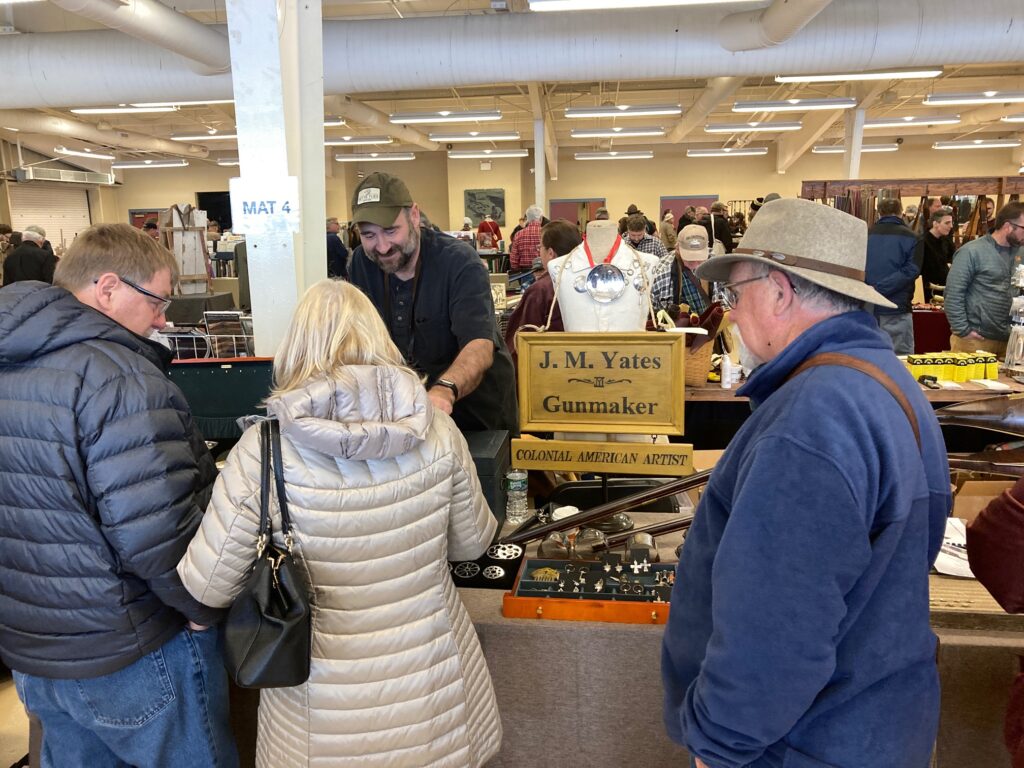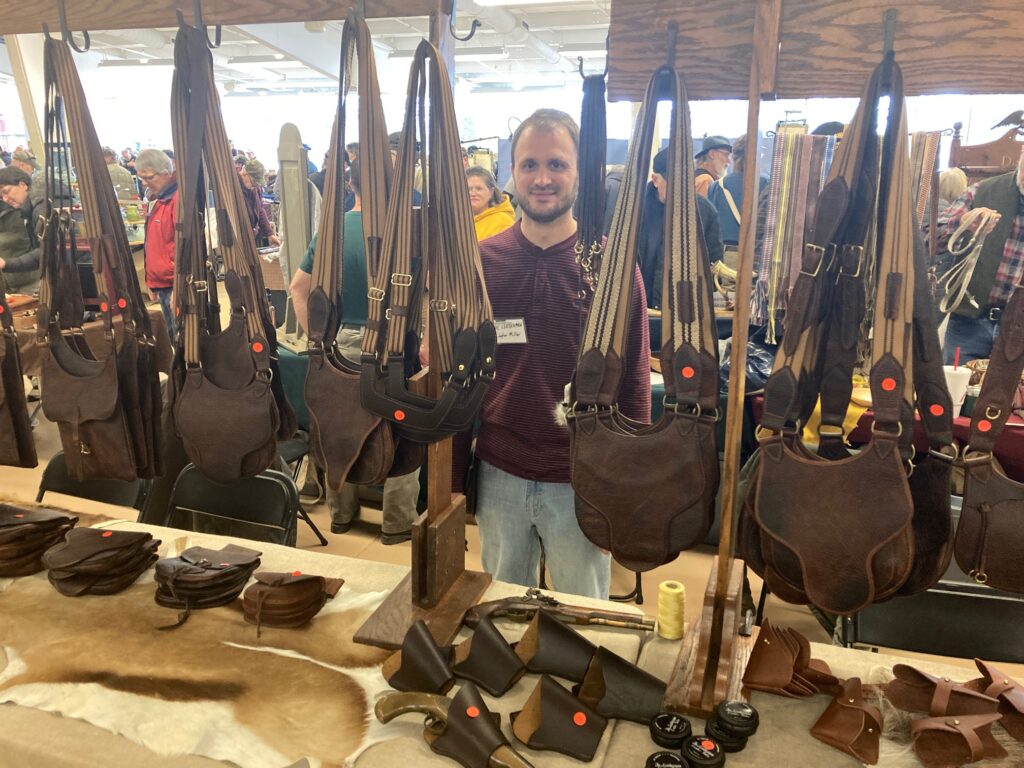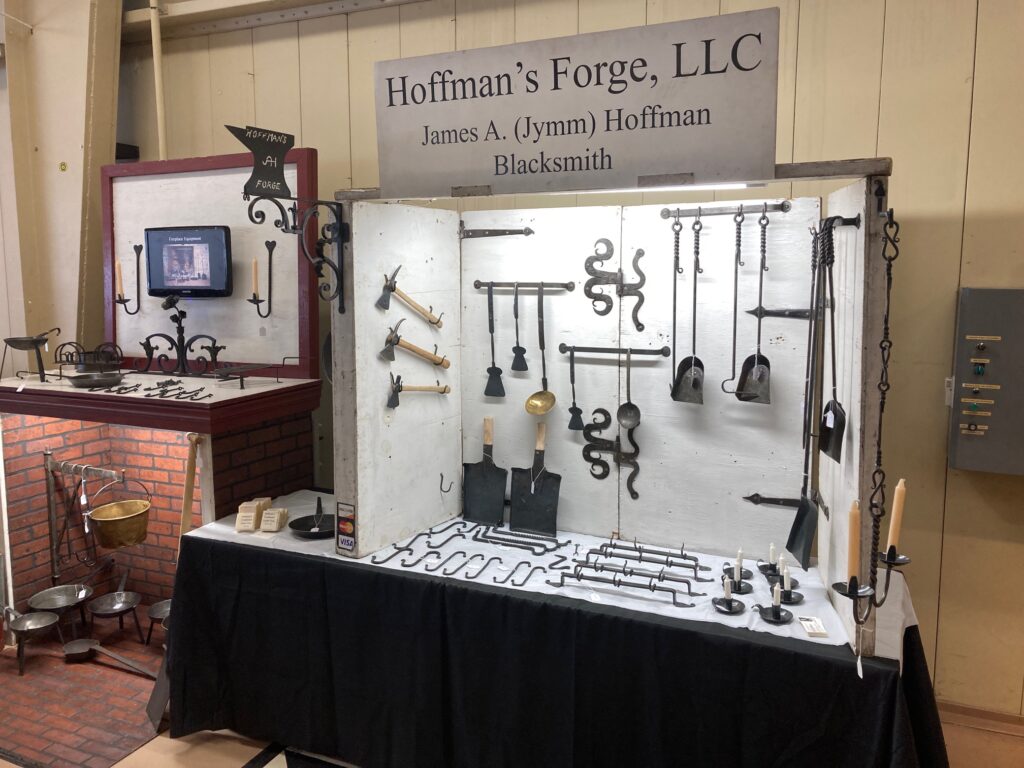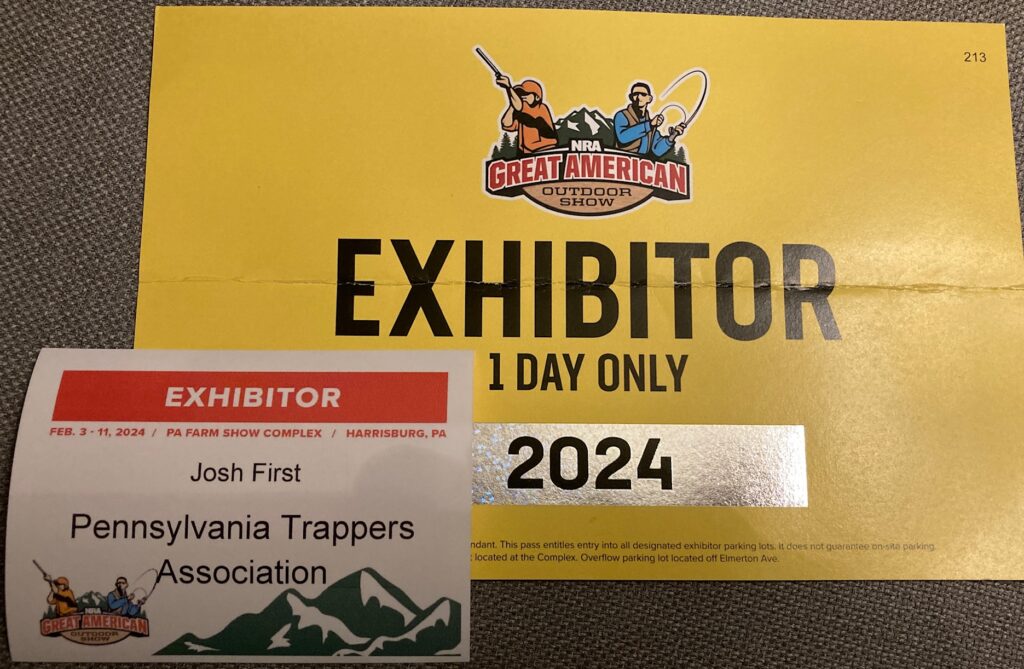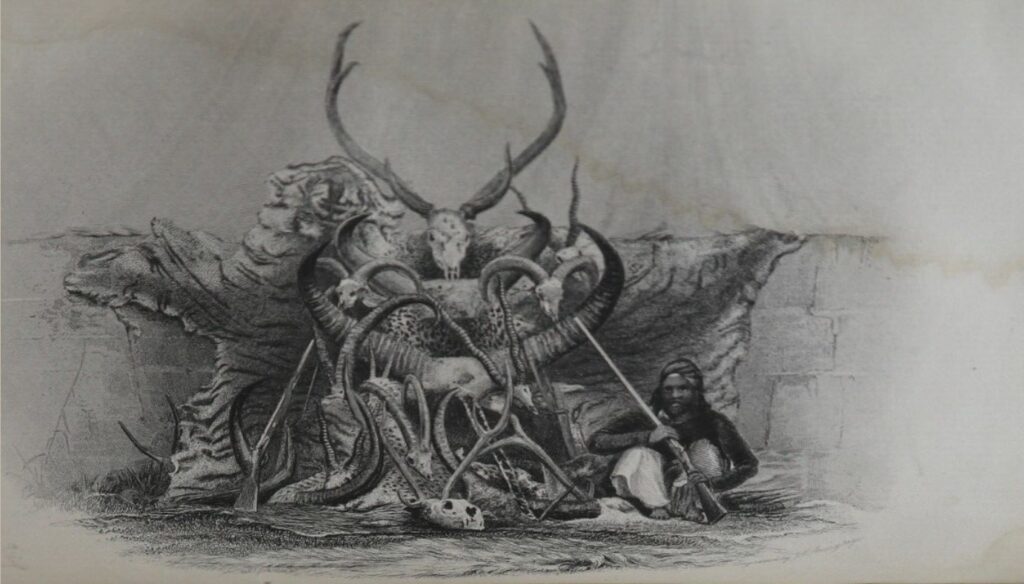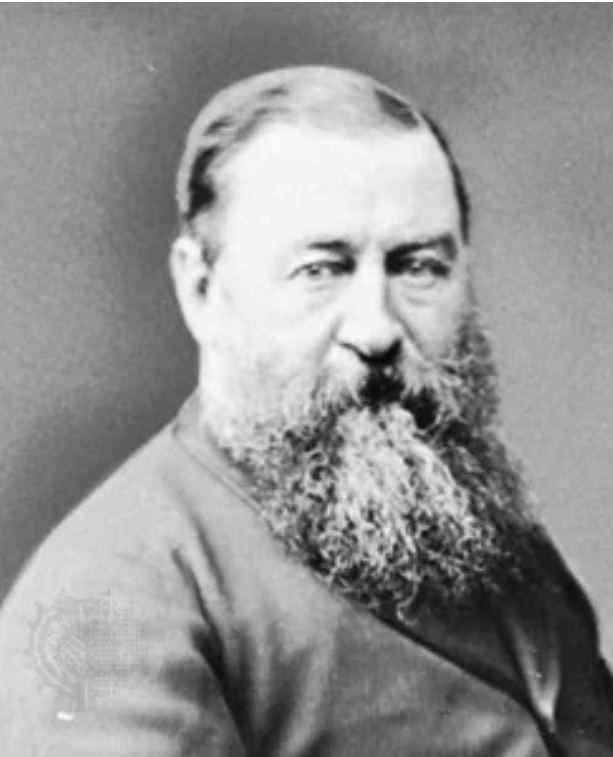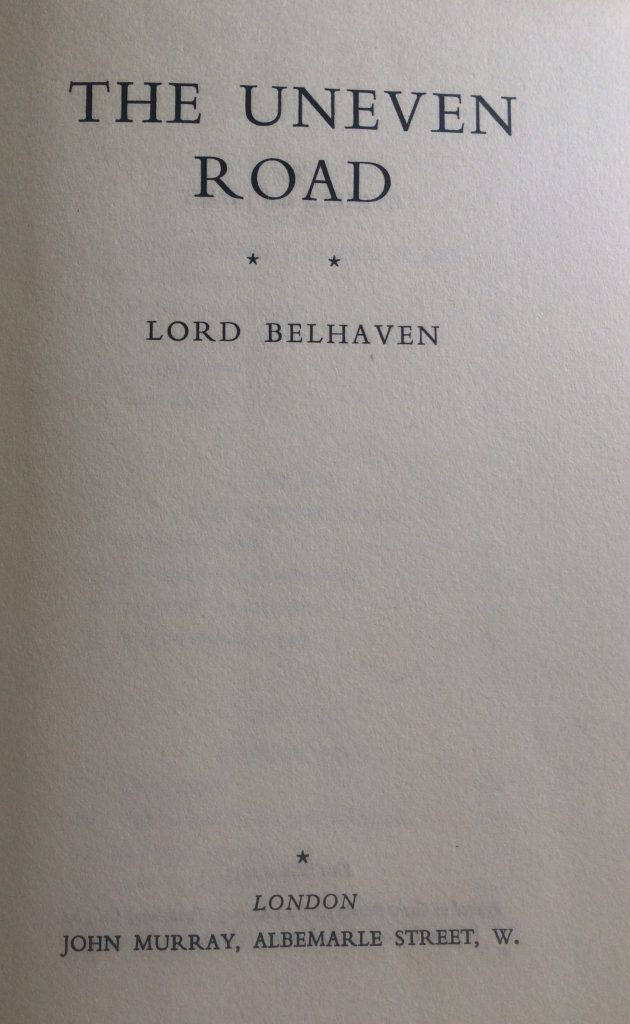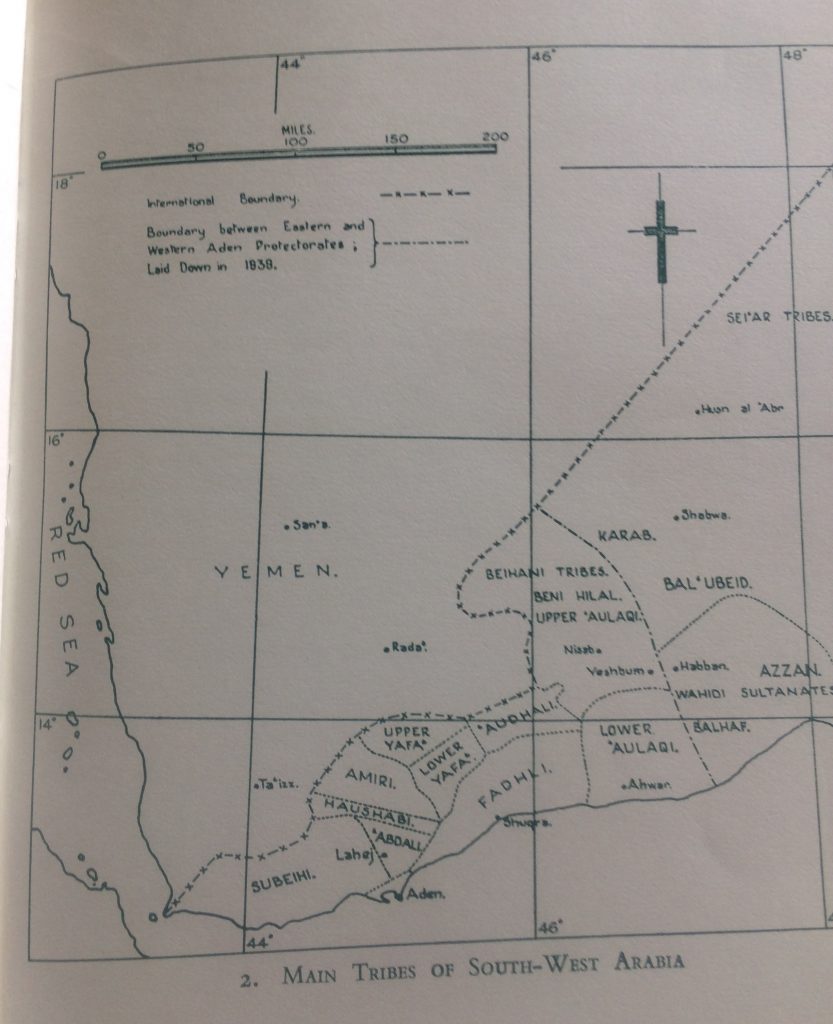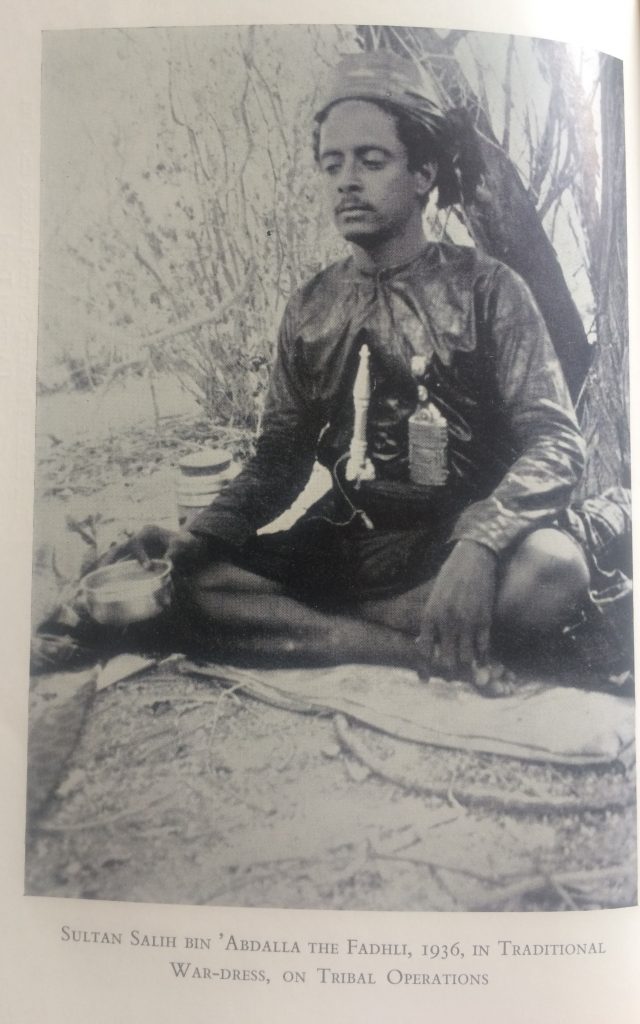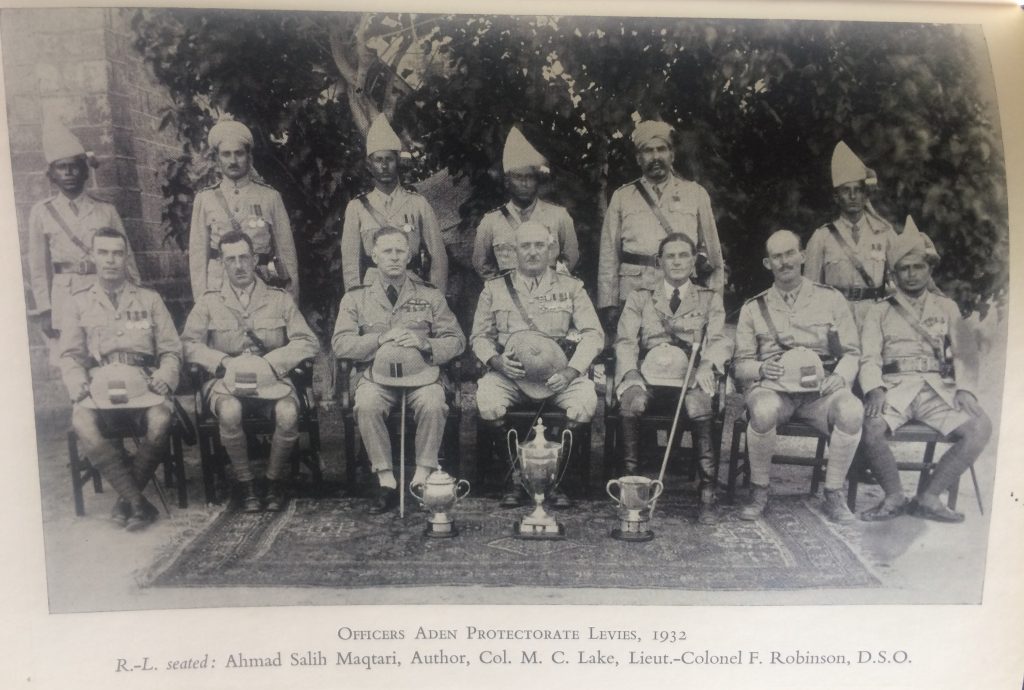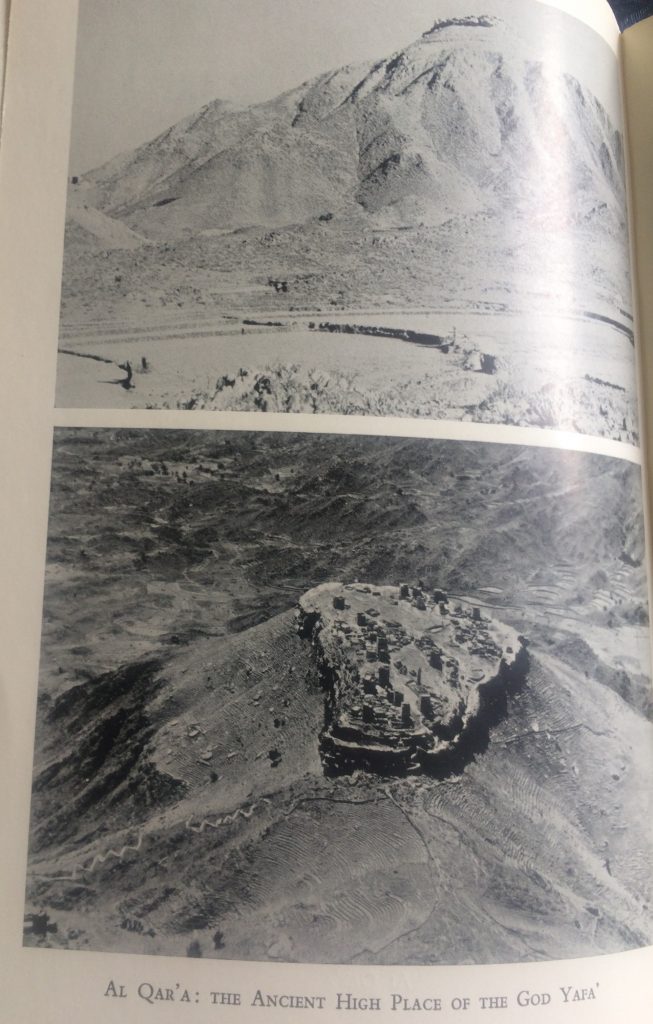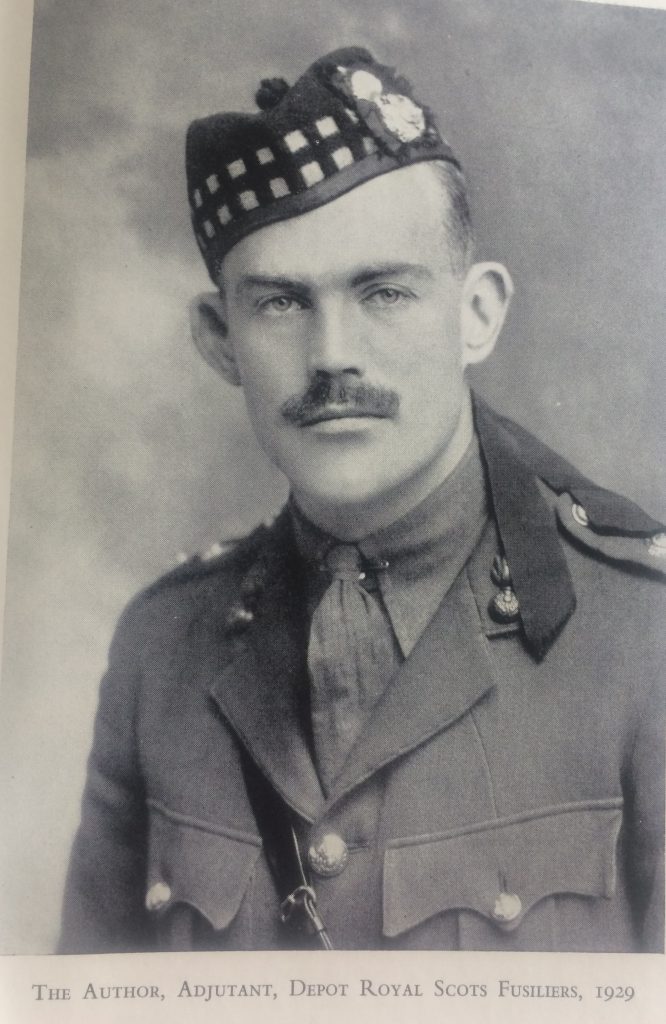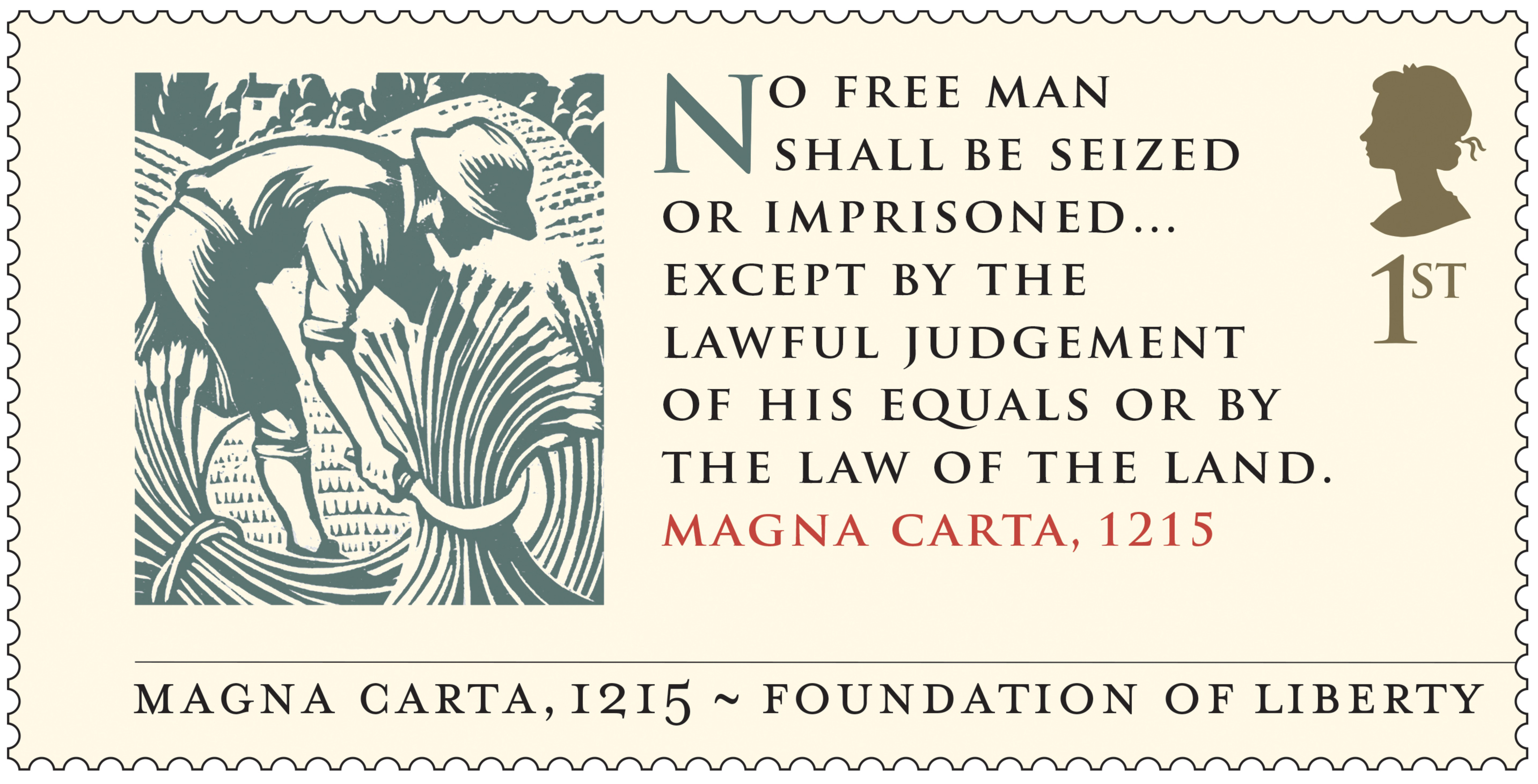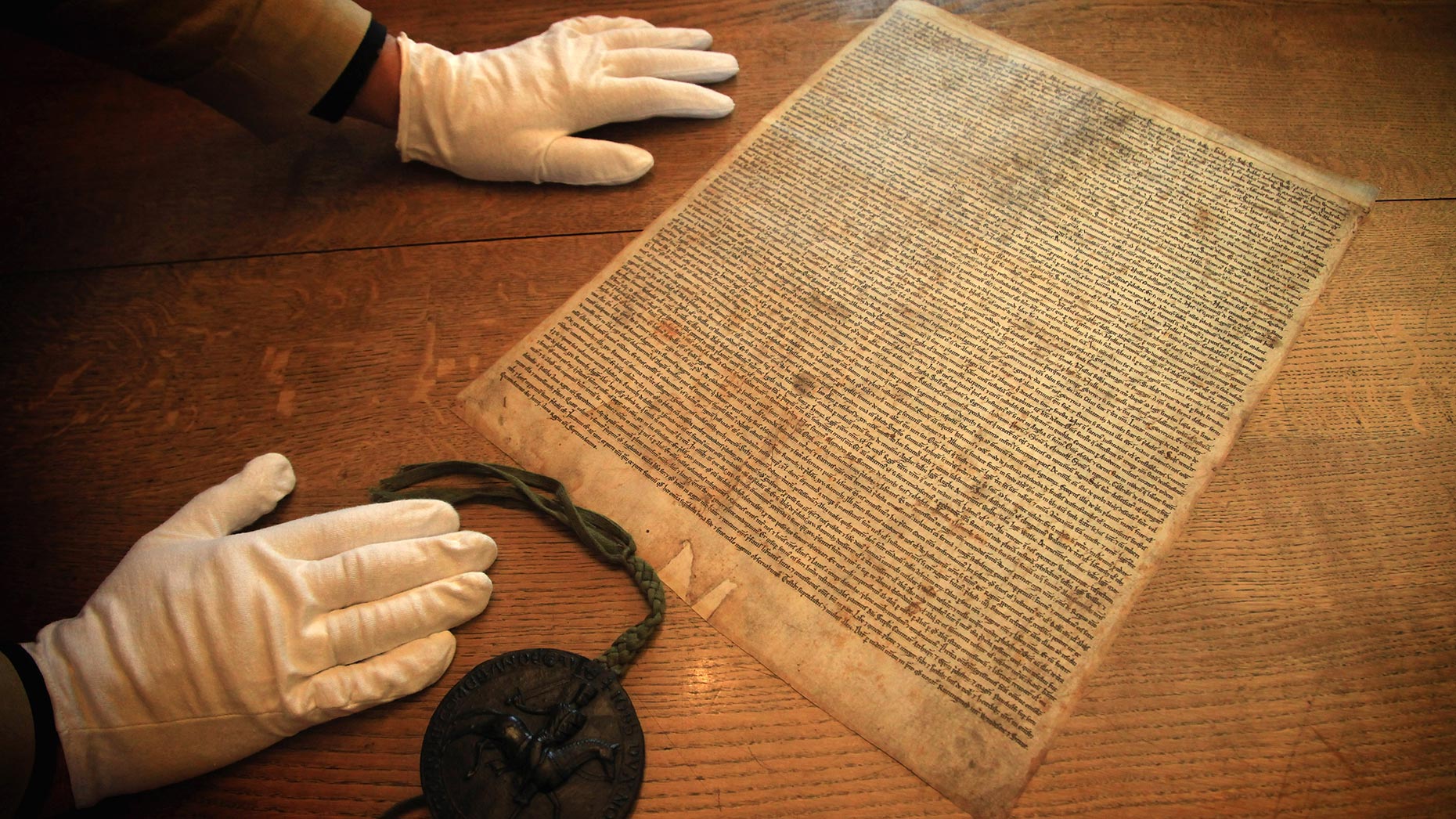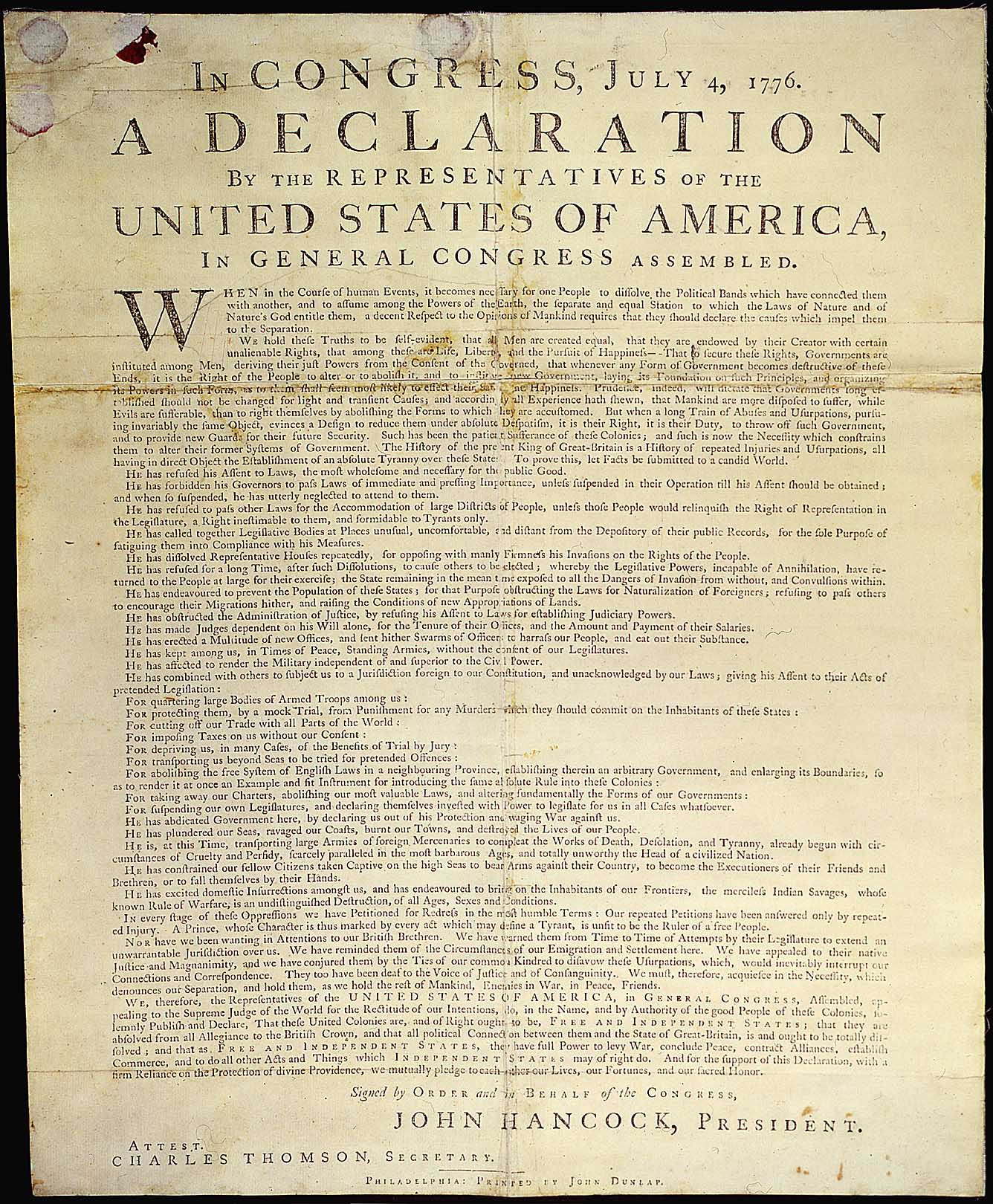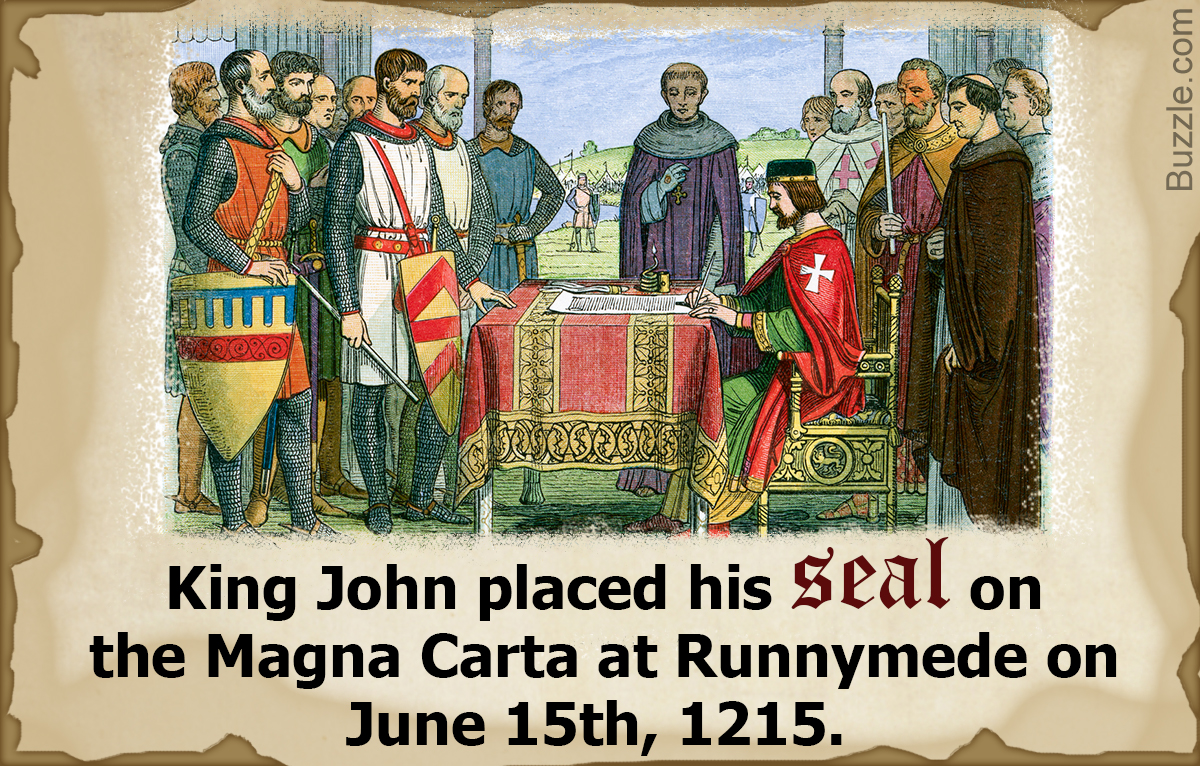Posts Tagged → british
Two great shows coming up soon!
Two great shows are coming up soon. If you live in central Pennsylvania, then fortunate you. If you live farther out or even far away, even out of state, both are worth traveling to, even from far, far away.
The first show starts this Friday, the 18th Century Artisan’s Faire, now (as of last year) held in Carlisle, PA, at the Carlisle Expo Center at 100 K Street. It used to be called the Lewisburg Show, because for decades it was held in Lewisburg, PA, along Route 15. The Carlisle Expo Center is SO MUCH BETTER than the prior hotel venue. I went to this show last year and could have easily spent both days there. Better lay-out, better room, more room, higher ceilings and far better lighting.
If you are afflicted with history-itis, with a passion for hand-made tools and utensils of all sorts, including eating utensils like forks and knives and plates, with blacksmithing and historic reenacting, with hand-carved curly maple furniture and gunstocks, leatherworking, with anything black powder or flintlock or percussion, with 17th and 18th century clothing, then this show is for you. I have been attending for I don’t know how many years, a long time, and every time I go it’s worth it. The nationwide talent that is assembled at this show is amazing to experience.
The second show starts this Saturday, the Great American Outdoor Show. It is held for the whole week in Harrisburg at the Farm Show Complex on Cameron Street. This is the “new” show built on the ashes of the old one, which I helped end by starting a boycott.
The prior show was run by a British promoter, and they had no feel for America, Americans, guns, gun rights etc. In the immediate political backwash of another Democrat-run mass school shooting, that British promoter tried to prohibit exhibitors from having AR-15 platform rifles. That set off a slight negative reaction among the paid participants, advertisers, and attendees that culminated in the boycott, which ended the show that year. And it ended that tone deaf promoter’s role in the show ever-after.
In the press interviews I did about shutting down that show, my favorite quote was “The British did not understand Americans in 1776, and they still don’t understand us in 2012.”
To which I think we can easily now add the entire Democrat Party, because it is openly and officially the political party of big government, of citizen disarmament and gun confiscation, of digital currency and your money control, of high taxes, of speech control, of thought control, of censorship, of car control, of health care control, of Covid lockdowns and private citizen movement control, but not USA border control.
Nope, under the Democrat Party the American border is wide freakin’ open to tens of millions of anyone and everyone from around the world.
So, go to these two shows. Both are very family friendly, regardless of what your family members each like. You will be really happy you did go. Enjoy America and freedom while you still can.
On Friday and Saturday you can rub elbows with gunpowder horn makers, flint knappers, flintlock and percussion rifle makers, black powder bag makers, historic dress and bonnet makers, tri-corner hat makers, and blacksmiths.
On Sunday you can go to the Farm Show Complex and see the whole world of tactical socks and vests, endless semiauto blast-em rifles as well as very cool historic lever action rifles and Wild West revolvers, bushcraft duck calls, high fence deer hunting legends and other TV created one-dimensional personalities, useful ATVs, fabulous boats, and cool end-of-the-world survival RVs, high tech synthetic and high tech wool outdoor boots and clothing, hunting guides from all around the world, and all kinds of fishing stuff. The Great American Outdoor Show really is an amazing experience. I highly recommend it.
I myself will be both a visitor and a volunteer at the GAOS. After many years of volunteering at the show and its predecessor, I took 2021-2023 off. This year I will be volunteering one or two days with the Pennsylvania Trappers Association, a wonderful conservation group of which I am a Life Member. Come on by the PTA booth and chat with us!
America is gonna need a Truth & Reconciliation Commission
When the Democrat Party’s brutal and lawless assault on Americans who support democracy and the Constitutional Republic as America was founded comes to an end, America is going to have to go through a South Africa-style Truth & Reconciliation Commission process to resolve the endless injustices now being committed against political opponents of the evil Democrat Party.
Just looking at the Department of Justice’s latest illegal attack on President Trump, we all can imagine what horrible pain is in store for the rest of us citizens. DOJ AG Merrick Garland won’t voluntarily release the affidavit that was used to secure the bogus search warrant that allowed thirty federal agents to swarm through President Trump’s personal belongings inside his home in Florida, searching for a crime they don’t know of yet. Already the DOJ and FBI are returning personal items that were improperly removed, like President Trump’s passports.
A legitimate search warrant written according to the US Constitution specifies EXACTLY the items that are to be removed from a private home or business. Any search and seizure that results in all kinds of “oopsy” property removal is on its face an illegal search and seizure. But this DOJ FBI brutality isn’t a mistake, it is on purpose. They are looking for a crime, any crime, so they can hurt a political opponent, which is illegal.
It was this EXACT bully behavior by the authoritarian British against the early Americans that resulted in the Revolution, that resulted in the US Constitution and its Amendments, so that government could never again behave in such a lawless fashion.
Yet here we are now, and here we are headed for more of this behavior with not just the DOJ and FBI, but a new literal army of IRS armed agents coming to our homes. It seems that under the Democrat Party, ruling the populace through SWAT team is the new daily norm. Which of course is not normal, and it is not legitimate. American voters did not and would never have given the Democrat Party any of this authority or power, and it is why the Democrat Party had to steal the 2020 election, steal the presidency, and then hijack the federal government. They are now building on that steal and aggressively consolidating power and control over every US citizen.
Inevitably Biden’s lawless, cruel, evil, and oppressive misuse of official government is going to result in a lot of badly hurt people and seriously damaged lives. Americans who are right now kind of coasting through their lives are about to get a seriously rough awakening from Biden’s SWAT teams and heavily armed IRS agents. These agents are not coming to our homes to help us out. They are not coming into our lives to help us and assist us in complying with a complex tax code that requires mental gymnastics even for the Certified Public Accountants we use to report our taxable income.
No, these heavily armed federal agents are all arriving in our kitchens and living rooms and dining rooms to control us with an iron fist, to arbitrarily and capriciously hold us extremely “accountable” for even the smallest and most honest of our mistakes. Just like the British bullies did in the 1770s, with all of the unfair human wreckage they left in their wake. And before that, just like the Sheriff of Nottingham did in Britain.
So if old history is repeating itself now as tax compliance authoritarianism and it becomes the new normal, then maybe America will need to borrow a page from more modern times. For example, after Apartheid ended in South Africa, and yes I believe that even after just eighteen months America is already right now deeply into an Apartheid-like system, the only way to help South African citizens heal and learn to live in peace with one another was to have a Truth & Reconciliation Commission. And America is going to need the same thing.
The American Truth & Reconciliation Commission’s purpose will be to address and resolve the terrible political injustices that are being perpetrated by the Democrat Party under color of “law.” Anything other than a process like this is going to leave a deep and festering scar under the surface of America’s skin…pretty much like what happened after the Democrat Party’s Civil War from 1861-1865. Back then the Republican Party took away the Democrat Party’s African slaves, and the Democrats never forgave the Republicans for it, and the Democrats created all kinds of Jim Crow laws, poll taxes, the Ku Klux Klan, and lynchings, to hold onto their power. And here we are, 160 years later, with the Democrats yet again trying to brutally control and enslave everyone. Political lynchings of people like President Trump are only the beginning.
Americans eventually getting out from under Democrat Party brutality are going to have to go through a better process than we did the last time the Democrats did this. Let’s start planning the American Truth & Reconciliation Commission now.
Book Review: The Uneven Road, by Lord Belhaven
The Uneven Road (1955), by Lord Belhaven
I read this fascinating book twice, and I recommend you read it at least once. Heck, just the old black and white photos of mysterious holy cities, like al Q’ara, (taken with early hand-held cameras from a bi-plane in the 1920s and 1930s) and traditional Arab tribesmen, both even today far out of reach of Westerners, are worth the five or ten bucks it’ll cost you to buy it on eBay or Amazon. For just five bucks you can get one of these fascinating and educational books, and have a most enjoyable weekend reading, and learning. Find me another great, safe, healthy mind trip for five bucks, please.
Why review a book published in 1955, about the now dead Brutish Empire? What made the British Empire so grand, so great? Setting aside the natural feelings of those locals who were subject to British rule, for better and for worse, one cannot help but marvel at the remarkable discipline, planning, administrative organization the British brought to their empire. Any nation today would be well served to get one tenth that level of service from its own government.
And why would a book published in 1955 be interesting today? For one thing, history has a tendency to repeat itself, or to repeat versions of itself — things that happened in the past seem to happen all over again. If we who are living now can harness the lessons of the past, then we can avoid the mistakes of the past, too; or at least so goes the best thinking. Certainly one must know history in order to know what happened, and how to identify when the same forces are at work once again.
In order to understand where we are today, we must look at what decisions and resulting actions got us here, and why those choices were made (come to think of it, I recently read another similarly aged but highly useful book titled Why England Slept, written in the 1940s and 1950s, then authored and published in 1962 by some then-nobody named John F. Kennedy). The Uneven Road does an excellent job of explaining much of the Middle East and East Africa through one man’s colorful and risky exploits from a military and diplomatic hot seat along the Indian Ocean and the Red Sea, and then into the Italian Alps. Judging by current events, little has changed in the former.
As the title implies, the author took an uneven road in his long life, following completely neither his traditional Scottish upbringing nor his adopted British devotion to Empire. As he says in so many ways throughout the book, Lord Belhaven is a lot like his forebears, individualistic, strong, self-driven men who admired authority and convention as much as they bucked them and tried to fit into them on their own terms. Or one might say, Lord Belhaven and his ancestors tried to make convention in their own image. As an American, to me this independence streak is a highly laudable trait, even if it did damage to the already impressive careers of Belhaven and his father and grandfather.
The author is both very open-minded for his time, gleefully throwing off class and religious barriers that today seem so unbelievably feudal, especially to Americans (and familiar to those Americans who enjoyed the Downton Abbey series) with our hodge-podge zero-caste-system, but which were quite dominant in his early years. He is also representative of some persistent silly views that are also peculiar to certain groups of people where he is from, even today. To me, an American, whether I agree or not, this is all part of being a natural, well-rounded human being, and a sign of being interesting. Everyone has prejudices and sharp-edged opinions, and everyone is entitled to them. No one is perfect, our author does not claim to be perfect, nor does he engage in the vacuous virtue signaling which so sharply defines today’s Western civilization. More to the point, neither you nor I are anywhere near perfect or nearly as exciting as Lord Belhaven, and only very few people you or I have met or ever will meet are going to be nearly as interesting as Lord Belhaven.
Writing as a soldier, administrator, diplomat, lonely husband and then divorcee, and amateur historian/ethnologist/archaeologist, Belhaven is a gentleman, and also a manly man. He is the old archetypical British\Scottish aristocrat patriot, both swashbuckling and under steely self control, a thing of the past which, my gosh, we now could use much more of in our own time. He is clearly a warrior, and an effective one at that, and yet much of his book is stories about how he was not such a great warrior, or how he was charged with establishing peace in lawless places through diplomacy, and yet relied upon deadly warfare.
As he reminds us, especially with the burning of the village of Jol Madram, diplomacy without the real threat and the occasional implementation of brutal violence is simply indecisive inaction, a weakness that inevitably invites more lawlessness or aggression. For Belhaven, there is no foolish, circular “conflict resolution” without resolving the conflict to concrete terms he likes and which work for the most people. Instead of getting “triggered” and fainting into a safe space when confronted with adversity, Belhaven the man of action responds by putting his finger on the trigger of his revolver and explaining just how things are going to get back to full function, or else. In a Western world today of namby pamby political correctness and feminized men, reading this book I could not help but think How refreshing! And also, Where the hell did our masculinity go?
The author’s voice is forthright, unafraid, honest, and though a few times I may disagree with his views, I keep thinking as the pages are turned, “Now here is a man I could respect and like!” Would that Western Civilization today had many more men like Alex Hamilton, aka Lord Belhaven.
Spanning the 1920s through World War II, and published toward the end of the British Empire, The Uneven Road is one more fascinating on-the-ground report in a line of the “Hell, I was there” genre of personal adventure histories written by British military and political officers across the British Empire, upon which the sun did not truly set until the 1960s. The Uneven Road is one of the last from the frontier, and in my experience it is one of the better written and certainly the most personally reflective. In some ways it is a companion piece (maybe even a necessity) to books written by or about others who traveled, explored, dug archaeological treasures, politicked, and fought in and around the Arab Peninsula, such as Lawrence, Philby, Ingrams, Jacobs, and others.
There are many, many examples of these personal field reports and histories from the 1790s through the 1960s. Some are famous, most are obscure, some are kind of boring, and many carry an overt agenda, and yet almost all are illuminating about life among the British Empire’s boots-on-the-ground administrators and soldiers, as well as the occasionally momentous political events of the day. The fact that these personal histories exist at all, and that they are often well written, says a lot about the high caliber of the British and Scots of that time, both the writers abroad and the readership waiting back home. The Uneven Road meets or exceeds all these standards.
While other major cultural “encounters” and confrontations have been largely or absolutely settled in the same time period, in key ways that are of great interest to the modern reader, this book is about East-meets-West, a contest that has only grown sharper and more defined a full hundred-plus years after it fully got under way, as described in these pages.
Britain: A Culture of Selfless Patriotic Duty
One need not read a book to hear or know about England’s long established culture of patriotic duty and self sacrifice for king and country, but reading this book will help the interested reader gain real appreciation for both the depth of feeling most Britons had then, and for the real personal cost it then meant later on in their lives. The unbelievable battlefield losses in World War One and WW II greatly changed England’s culture, resulting in a legacy of pacifism, fear of inevitable conflict, and self-defeat we see officially operating today.
Throughout the first half of his fine book, Belhaven off and on artfully weaves an analysis full of personal anecdotes of British military culture, including how wealthy aristocracy would often take a vow of poverty (as opposed to running a family business or a valuable property) to serve in the military, for the simple satisfaction of providing patriotic service to the nation. The following quote only touches on this, but it covers enough other turf to qualify for mention here:
“One Saturday, towards the end of our last term at Sandhurst, Tony Keogh and I were both excused [from] work because of minor injuries. Tony Keogh was a dour Wellingtonian, whose ambition was to give a lifetime’s service to Waziristan on the northwest frontier of India, a country which his father had been the first to survey.” (page 40)
Waziristan of the 1920s is today several different ‘stans, including parts of Pakistan and Afghanistan. It included then as it does now all of the intolerant, violent religious fanatics who still make it such a special place. From the 1880s through the 1940s, British troop losses there were big. Can you imagine being the first person to scientifically survey a significant portion of the planet, this very rugged, remote place specifically, surrounded by such danger? And then bear a son who simply wants to pick right up where you left off? Such was the tough, brave stuff the British were made of, once.
<sigh>
And it was that same patriotic fervor and absolute selfless commitment that made such brave soldiers for World War I and then World War II, and then resulted in the pacifism of modern Britain, when few men returned home:
“Toll for the brave!” that most perfect of slow marches – how often had we marched to its slow, sharp rhythm. When I hear the tune now I can see, as I saw then, the high, shining fence of bayonets, the straight, erect lines moving forward with irresistible menace and force, the very symbol and image of war. And all with its glint of youth unafraid, unconquerable. Toll for the brave indeed; few who marched that day have pottered on as I have done for fifty years.” (Page 40)
<sigh>
His description of his surprise at winning the Sword of Honour at Sandhurst is both funny, and then sad, as his stiff-upper-lip military father refuses to acknowledge it until two years afterward, and only then sarcastically. That sword becomes a snapshot of his challenged relationship with his father and also a symbol of British culture.
Report from the Frontier: “It was impossible to be bored in Aden”
If India and Africa provided the greatest quantity of opportunity and adventure (the British defeat of France’s fleet at the Nile, the ‘Mountains of the Moon’ search by naturalist-explorers Burton and Speke for the source of the Nile, the Mahdi, the Zulu Wars, Islandlwana, Rorke’s Drift, the Boer Wars, and so on) for these far-flung representatives of Her Majesty’s Service, it was the Near East and Middle East that created the most vivid and gripping images consumed widely by the public, even today.
Think of “Lawrence of Arabia” and all the thrilling weight that phrase still carries a hundred years later. And so just a decade-plus after a charismatic young Brit, T.E. Lawrence, led the Arab revolt against Ottoman Turk rule throughout the Near and Middle East, it is primarily on and around the Arabian Peninsula that Lord Belhaven’s book takes us. It is an often militarized and occasionally one-man-army journey by foot, camel, horse, donkey, bi-plane, and boats of various type and size, including some pleasure craft of his own construction.
Based in Aden and sallying forth through abandoned ruins from hidden, unknown, lost civilizations to high mountain forts inhabited by fierce tribes, Belhaven fearlessly and luckily does his best to bring order to the fractured tribal chaos of the southern tip of the Arabian Peninsula, what today is known as Yemen and known then as the British Protectorate of Aden. Like most Brits of his time, Belhaven was an Arabist, an Arabophile who simply looked past the stark differences of Mohammedanism compared to his own culture of gentle mercy and forgiveness, stricken as he so clearly was by exotic Arab ways. His gunfights, in which he was sometimes greatly outnumbered, the aerial bombings, and his knife-edge nose-to-nose confrontations with cutthroat highway gangs and treacherous tribes are the stuff of legend; his fishing and hunting trips during working hours are not, though he does describe them in obvious joy and often at his own expense.
Though in a serious tone Belhaven opens up about his family life in the first third of the book, in the rest he makes it clear that he knew how to have fun and push British foreign office sensibilities beyond their traditional staid demeanor.
Belhaven gets extra credit for a dry wit and self-deprecating humor applied from several miles up. He does not take himself too seriously, or even seriously at all, at times, even as the bullets are flying and his life hangs by a thread. This bon vivant tone heartily leavens the serious life-and-death situations he describes, including shooting himself in the foot in the heat of battle, and nearly shooting his Somali hunting guide who chases a large leopard out of a cave and into Belhaven’s face, not to mention his rear line and front line experiences in World War Two.
One of the artifacts of time and place is the author’s fascination with genetics, a hot (and also destructive) topic of that era. Repeatedly marveling at the “pure” inbreeding of certain tribes along the southern Arabian Peninsula, the author relied upon simplistic, romantic, and plainly incorrect notions of genetics. But this is to be chalked up to the general and long lasting British awe and love for the colorfully fierce Arab nomads of that region. Whatever they did, no matter how backwards or weird, was very cool. Who can blame him for thinking thus? Were you or I to live out there today, we would find it just as alien and compelling as he did, and it would all be just as cool now as then.
Insights into his own family struggles with intimacy and finances, and the perhaps unrealistic lifestyle expectations accompanying title, are illuminating for those wondering how the famous British aristocracy slowly crumbled from the inside and out.
When it comes to archaeology, what is not mentioned is louder than what he might have written. Lord Belhaven apparently had an eye for long lost antiquities easily unearthed with the toe of a boot in the loose sand of some long lost civilization in the middle of the blistering desert. In a tempestuous sea of worldwide archaeological looting by British nobles, scientists and adventurers, Belhaven’s personal interest in a few old broken, abandoned things lying in the dirt was strangely singled out for criticism by a couple of bespectacled Peabody types in imperial administration back home. Belhaven makes no mention of any of this in his book, and maintains his focus on big picture civilizational development. As he should, in the tradition of the fighting naturalist-archaeologist hero; a kind of Indiana Jones.
Detailed references to carved alabaster amid the sands, and marble ruins, lost cities, dams, water works also occasionally appearing and then disappearing amidst the shifting sand dunes add an element of authentic mystery that is harnessed in the Indiana Jones and The Mummy movies. Except that Belhaven was actually there, and saw and explored those ancient mysteries with his own eyes.
Will a couple of “Aw, shucks” ruin all the “Atta Boys” in this book?
Though he does not explicitly set out to do so, the author’s plainly spoken recollections invite the reader to share the author’s unspoken pangs of loss over decreasing British influence and culture.
In 1955 the author was in good company, with his views on race (a word he uses many times with several different meanings), skin color, religion, and social class, even as he was clearly departing from those long-held views. Bigotry and class snobbery were then becoming a thing of the distant past, a change which Belhaven mostly embraces and in many ways led in his own “black sheep” personal way. Those anachronisms particular to that time period he retains were either common figures of speech, cultural crutches, or concrete functions of Caucasian minority survival in otherwise hostile foreign places.
We today may not agree with him or his use of some words, but he usually explains himself well, and so we can often understand his thinking. Understand is the key word here, and it does not mean or infer acceptance or approval. And if the reader wonders why I, myself, am insufficient in my condemnations of the author’s few lapses, may I suggest one consider the word “tolerance,” or the phrase “open minded,” or that almost extinct word “understand.” In other words, that was then, this is now, these are different times than then, and once again, everyone has opinions and views that others find “offensive” or uncomfortable. Get over it, get over yourself, learn to tolerate differences in opinion, and move on. I did, and you can, too.
In an educated and open society such as ours, everyone is entitled to an opinion, even a wrong opinion, and even a bad one. God knows, today’s self-righteous book-burning censors falsely accusing everyone else of political heresy and racism have plenty of bad and wrong opinions themselves. In the past, people have been and should continue to be able to disagree with one another without taking silly offense at the simplest of differences, and then retreating to corners and brandishing the war colors. Goodness gracious, people, put away the guillotines! Give people some space to be wrong, or to explain why they thought they were right. And that maturity is what a reader must bring with them to get the most on this trip through time.
For example, in a book full of many humorous and comical stories, anecdotes and quick turns of phrases, there are a couple references to race and genetics, captured so perfectly in The Uneven Road, that really shine a light onto the important evolutionary changes of thinking and attitude about race and skin color happening in the pivotal 1950s. Recall that Belhaven is a born aristocrat:
“I found the whole subject of breeding, as it was accounted in our curious society, absurd; if a man married the crossing-sweeper’s daughter, no one bothered to find out about her breeding; her father’s trade was enough to condemn the match. When it was discovered that he was a rich Jew, who swept crossings through eccentricity, opposition could be relaxed, particularly if he kept race-horses and was a member of the Carlton.” (P. 29)
One page later Belhaven hilariously describes how his Eton school class failed a basic introductory genetics course on mice, with the best and wildly cheered answer to the teacher’s question being a boy’s half-assertion-half-question that inbreeding causes parents to eat their young.
Fast forward sixteen years and Belhaven, now working as a British Political Agent in the Arabian Peninsula, writes: “I have sat in their gathering of Princes, in their Chief’s lamp-lit reception-room and watched them, their skins shining like polished gun metal in war-paint of oil and indigo, a dull sheen of gold and silver in their great daggers, curved with the curve of the moon; the remnant of a great nation indeed, virile, unconquered by arms or by time, handsome and courageous. And marvelling, I have remembered that these men among whom I sat married always, by long custom amounting almost to law, among their own family; so through the millennia they have achieved an extraordinary purity of breeding…for a period of five thousand years…” (P. 86, emphasis added)
And so, as much as Belhaven mocked his fellow students on their failure to grasp the essentials of healthy, necessary genetic diversity among mice and humans, he then later includes himself in their unfortunate company by endorsing the worst sort of human inbreeding, still going on even today in the Arabian Peninsula. This is the intellectual price one might pay for getting emotionally involved with something, as did Belhaven and all of his fellow Arabists. However, it remains fact that none in that time could have remotely foreseen that a surprisingly large number of parents across the Middle East would today encourage their own children to engage in suicide bombings and attacks. Talk about parents eating their young…
Just coming out of the real, actual Lawrence of Arabia time, an amazing time of high military and political adventure, and his living and working in that exact location with many of the same people, Belhaven’s near infatuation with all things Arab and Islam were then and are now understandable. His views on the Middle East were widely shared among his fellow Brits and Scots at that time. Even today many British still cling to detached, romantic notions of Arabia and Sharia-compliant beheadings and stonings, though having now painfully absorbed nearly half of the Arab world into London and having watched the other half wage sadistic war amongst themselves at home, and against Western Civilization abroad, has been shifting those old romantic notions into some other cold, hard, realizations.
Similarly, his views on Jews and Judaism range from the ground-breaking class acceptance (done with excellent humor at the expense of his fellow Brits; see above) to the old traditional British snobby disdain. He was only a little less tough on the Church of England. One must wonder what Belhaven would have written had he lived to see most American Jews and the Church of England and the current Pope all almost wholeheartedly embrace Marxism and anti-Western anarchy. If there is a resurrection of the dead, I want to be right beside Belhaven, so I can be the first to hear his colorful, insightful reaction to these unfortunate, really unbelievable facts.
One thing Belhaven did not live to see was the now-modern state of Israel, the then-nascent version of which he refuses to name in his book, but which he negatively alludes to several times. This is the old fashioned British Arabist coming through. Of the Jews of Yemen he has a brief but historically important and also humorous first hand encounter and report; but he then fails to mention their subsequent unjust inclusion among the nearly one million innocent Jewish refugees ethnically cleansed by his cool Arab friends from their ancient, very pre-Islamic communities across North Africa, the Near East, and the Middle East.
“So we came near to the end of our stay in Sa’na. Champion [Sir Reginald Champion, then Civil Secretary to Aden and later its Governor] and I called on the head of the large Jewish community in the city. Although considered by the Arabs to be an inferior race, the Jews of the Yemen were well treated by the Imam [Imam Yehia, a Shia leader who later lost the Arabian Peninsula to the Wahhabi al-Saud family, and whose spiritual descendants today are the once-again rebellious Hauthis]…Now there are no Jews left, they have all gone to Palestine, a Promised Land without either the milk of human kindness or the honey of their expectations…” (P. 104)
Hello, Lord Belhaven, reality is calling now, just as it did in 1955. The Yemenite Jews did not just casually get up and leave their homes in Yemen of 2,000 years for Israel out of a desire for better falafel or flush toilets; they were universally axe murdered and driven out of their homes by the same Muslims you so admire, the lucky survivors arriving in Israel with the shirts on their backs, their family homes and businesses stolen and occupied, their bank accounts looted, their personal property removed by force, like all the other Jews from every other Arab country at the same time. So why Belhaven ignores these facts to get in some shots on Israel is, again, likely a question of the impact of that romantic infatuation with remote alien cultures. Were he alive today, he would probably be a Christian Zionist like another famous and contemporaneous British Arabist, Col. Meinertzhagen (who when introduced in private to Adolf Hitler responded to the perfunctory ‘Heil Hitler‘ with his own ‘Heil Meinertzhagen‘).
Did Belhaven write some occasionally harsh stuff? Maybe so, certainly by today’s standards. But so what. Get over it. On balance, this book is 99.999% fascinating, illuminating, educational, and important history. Why judge and then dismiss the entire work based on a couple anachronisms from his own day?
As briefly mentioned above, one of the big challenges our younger generations are failing at is their tendency to immediately be offended by, and then harshly judge and dismiss, older generations by applying current standards. Instead of trying to understand how the previous generations thought, and why they fought way back when. Surely there must have been compelling reasons for the many momentous decisions that were made and then chiseled into stone or cast in bronze. Not everything back then is “racist,” which has become as hollow a crutch word as can be found. As old statues, symbols from important self-inflicted internal wars across America, are pulled down by screaming, infantile, anti-history mobs, one cannot help but wonder if the screamers will ever be interested in why the statue was erected in the first place. Or do they aim to simply re-write history (irrespective of the actual facts, causes and effects) to suit whatever political purpose suits them at some future time? I would rather have Belhaven’s honest accounting than a dishonest re-writing of who we are and how we got here.
In sum, whatever “Aw, shucks” Belhaven may have earned in a few spots here or there, they are far outweighed by the many “Atta Boys” he racks up over and over throughout this excellent book. For those younger folks who are actually and truly interested in understanding history, and how people’s views on race, religion, and income\ social standing changed over time in Britain and America, and how the Arabian Peninsula yet remains completely unchanged, The Uneven Road is a refreshingly honest and educational Exhibit A at the crucial time of the post-war 1950s.
Obscurity often means fascinating
Many years ago, in the late 1980s and early 1990s, when it was an actual newspaper that reported much actual news, instead of having the entire paper be one editorial after another masquerading as news, which it does today, the New York Times published a series of articles based on the simple methodology of having a news reporter (another extinct species the younger generations have never seen) open the New York City phone book (‘And what, too, is that?’ the younger generations ask) and randomly place his or her finger on the page. This was done ten times over the course of a bit over a year, as I recall. Whoever’s name was there over the finger nail got a call from the finger’s news reporter, who then did a detailed report on that person’s life. As the subsequent reports showed, despite living almost entirely quietly and privately in the big anonymous city, each and every one of those randomly selected people had nonetheless led a fascinating and often deeply compelling life.
And so, here now we have similarly plucked out of historical obscurity a book long out of print and probably originally of interest to few beyond aging British soldiers and Foreign Service dignitaries. Yes, here in Lord Belhaven we have a man whom very few have heard of, and as he is an aristocrat he is presently out of favor for having violated some social construct or…thing, even though he was a reflective, self-deprecating, risk taking and self-sacrificing humble public servant who enjoyed breaking with his own social norms and elevating many downtrodden. His life was more than fascinating, it was bigger than life, as we say. It was certainly bigger than my life or anyone else’s life I know of, and I know some pretty adventurous people in military and law enforcement, as well as international hunters. And today outside of Britain and America’s special forces operating abroad, very few public officials do anything close to what Belhaven did. And given the opportunity, few today would take it. Pity.
It was people like Lord Belhaven who put the “great” in Great Britain. Given how far and wide Hollywood looks for true-to-life stories, why no one has done a movie based on this book or on Belhaven’s life is one of those mysteries that highlights how shallow Hollywood is. Because it is true that Indiana Jones was mere Hollywood fiction, whereas Lord Belhaven was for real.
OK, call me a Whig
For those like me who are bothered by the simplistic, almost child-like identity politics of partisan political party identification, there is always the third way out: Independent.
True to its name, being an Independent means that one is much less driven by one-dimensional partisan interests, and much more broadly politically driven, by more philosophical interests.
Oh please, don’t kid yourself that the Democrats and the Republicans today represent philosophical strands of thought on government involvement in the lives of the citizenry. That is a joke.
Both main political parties, Ds and Rs, are each practically wholly-owned subsidiaries of their respective special interest groups. Because I believe in economic freedom, among other things, I am more drawn to the Rs than the Ds, who have now pretty much openly embraced socialism.
Socialism is the opposite of economic freedom, and socialism requires tremendous inroads into personal freedom to achieve its artificial “income equality” outcome. The Ds have completely thrown in with the communists, the socialists, the chaotic ANTIFA, and the 1%-ers like George Soros who fund all the anarchic, violent, anti-America street melees. If you like your doctor, you will not be able to keep your doctor, as the previous ANTIFA president demonstrated, despite his lies to the contrary. There is nothing here with this group or amalgamation of groups for the average American family trying to get by comfortably and live a simple, happy life.
However, there are plenty of Rs who are D-lite. Call them RINOs, GOPe, whatever, they are part of an established, elite political class who have elevated themselves above the broad interests of the citizen taxpayer. Their interests are narrowly economic and even more narrowly financial. Big corporations, the Koch Brothers, US senator Mitch McConnell’s big and financially rewarding ties to the Chinese government, the various guises of the Chamber of Commerce, etc.; all seeking to funnel as much financial gain into as few big pockets as possible. At the cost of Americans’ freedom now and future liberty.
Like the Ds, this GOPe group also tries to manipulate national policy for personal gain, with open borders and no checks on the el-cheapo labor force that comes with a huge cultural and school tax price tag. Obviously the GOPe has little in common with the interest of The People, either, though more economic freedom can be found here than with the Ds. Nevertheless, the GOPe RINOs are not really committed to defending citizen freedom and liberty.
Thus the demand for the Independent identity. The problem with the Independent Party is that it is frozen out of many states, where there is a bi-partisan death grip on electoral process. If there is one thing both Ds and Rs can agree on, it is that they and they two alone must control, if only occasionally share, political power and outcomes for everyone else.
This is why there is so much collusion and bi-partisan deal making in places like Pennsylvania, where our closed Primary artificially limits voter choice. Being an Independent in most places, like Pennsylvania, means one cannot really vote in a meaningful way in the primary election, arguably when votes matter most.
If the Republican Party of the 1860s was the vehicle for the great Abolitionist movement, much of that great spirit is now gone. Obviously. Oh yes, we have the congressional Freedom Caucus, a refreshing group of patriots and individualists. But they are largely outnumbered by the corporatists within their own party.
And never mind that the Ds demand their minorities aka modern-day slaves remain and vote on the Democrat Plantation, just like they did in the old days. And that everyone else fall in line with their autocratic control schemes. Or else.
I do not identify as a Democrat and probably never will again (to do so would be like gleefully standing by the road screaming “Heil Hitler” in 1930s Germany as the latest Democrat Socialist Messiah drove by), so trying to figure them out is a waste of time.
So, I am now reaching and looking farther back in time for a political identity, back to more philosophical times, to when big ideas had relevance to everyday lives. And in that past I find the old British Whig Party actually captures my current philosophical views.
The Whigs of the 1700s-1800s believed in spreading political power and decision-making to the citizenry as broadly as possible.
The Whigs believed in Abolitionism, the movement to abolish slavery. Plenty of economic and financial gain at stake there, so it was a truly principled stand in the meanest sense.
The Whigs believed in a parliamentary monarchy, which was radical at the time. Though the Magna Carta had been written and signed by the British king so many centuries before, its notions of freedom, representative government, and due process for the average citizen only took a few centuries to refine and percolate up and out to the point where the monarch’s absolute grip on power was actually, truly challenged by erstwhile representatives of The People.
That slow progress also involved a couple civil wars that were spiced nicely with religious feuding. Lots of heads rolling in the streets, families burning at the stake…what the Chinese call “exciting times.”
So given they had witnessed the great evil and cruelty carried out in the name of official religious control and power, the Whigs were naturally against the establishment of all religious tests for citizens, and against an official, established state religion. On this score they eventually lost, as Anglicanism is now the official state religion of Britain.
Similarly, Scotland has the Church of Scotland as its official place of worship. Not that either of these churches are very Christian nor pro-Western today. The Whigs correctly viewed official religions as being against the interests of the People, and nowhere is that more evident than in the Church of England’s official anti-West, anti-freedom do-gooder political meddling.
In short, Britain’s Whigs were non-conformists who believed in a third way: diffuse political power, as opposed to centralized power. They promoted economic freedom and individual liberty for all, including for the lowest slave.
British history and people may appear rather blase and boring to today’s casual reader, but rest assured it was nothing of the sort. An overabundance of violent civil wars resulted in the seemingly placid society one enjoyably visits today.
As a result, the Whig party was transcendent for almost two centuries. With its enlightened philosophical views came maximum freedom and opportunity for the greatest number of Britons, ever. Many Whig views found their way into the American Constitution.
Given the anti-citizen Uni-Party political establishment here in America, the weakness of the Independent Party, and my own Constitutionalist views, I am mighty tempted to join the 1700s Whigs. At least they stand for something real and valuable.
And what does it say that in 2018 we must now reach back to the early 1700s Britain to reconnect with our greatest individual rights and needs in 21-st century America?
Muslims 4, Infidels 0
British aid worker Alan Henning is the latest innocent beheading victim.
Reports are in that British drones know where the ISIS captives are held, and where serial sadist and chief beheader “Jihad John” is located in Raqqa, Syria.
But Obama is dedicated to half-hearted efforts, symbols, really, of opposition to ISIS. His aerial bombing raids have killed more camels and civilians than Islamic bad guys. A serious rescue mission could work, but it would require “boots on the ground,” which Obama opposes.
So far, sweet, generous Westerners are losing and the Muslims are winning. Radical Muslims want to cut off your head, and “moderate” Muslims want the radicals to cut off your head. There’s really no other way to confront this than to fight to win.
Some Westerners still adore Imperialism despite their protestations
If there is one hotbed of kooky political extremism in Western Civilization, it’s England.
As it was in the 1920s and 1930s, England is full of self-proclaimed “peace” activists and anti-imperialism yellers and screamers.
Their weak righteousness brought on World War II, and paved the way for massive treasonous infiltration of English government at all levels.
Many Soviet Russian spies were warmly welcomed by these activists to set up shop and undermine the individual rights and liberties that mark the strongest European democracy.
Anti-British sentiment ran and still runs quite deep in Wales, Ireland, Scotland, the Falklands, and many other far-flung places unassociated with England proper.
Yet where were those activists then, when those nations next to England yearned for their own self-determination? Sure, the activists accused everyone else (America, Israel, the actual anchors of Western freedom and tolerance) of vicious imperialism, but they themselves loved the unfair, artificial, imperialistic, forced notion of a UK. Scotland, Ireland, Wales were independent places with unique languages, cultures, and religions. They were hardly “united” with England by choice.
The Falklands? WTH?!
Why now that Scottish citizens are finally waking up to their own freedom are the British trade unions, left wing activists, and self-appointed bosses of equality silent on Scotland’s chance for true opportunity?
I’m not Scottish, Welsh, nor Irish, I am an American, but I do know that my country fought British imperialism many times, and that Americans greatly benefited from their Constitutional republic’s individual liberties.
It is time for Britons to act in a consistent, civilized way, and set aside their imperial self-interests.
As a former Scottish freedom fighter once said on film, FREEDOM!
Time for a Muslim Peace Movement, Now
Muslims are not victims*.
However, the victims of Islam are many, and continuing, and today yet another was unveiled.
British peace activist David Haines was beheaded by a Muslim activist on video, which I watched both in horror and in solidarity with him. David Haines knew what was happening, was absolutely composed, cocked his eyebrow and muttered some inaudible phrase to himself as his chin was lifted and the knife sliced into his neck.
David Haines died on his knees, his hands cuffed behind him, utterly vulnerable, not a threat to anyone. This is pure sadism.
Whether Muslims will admit it, or not, this sadistic evil violence has become the face of Islam to Westerners.
In the absence of massive Muslim marches supporting Western civilization and individual liberties, one can only conclude that Muslims everywhere agree with this Koranic behavior.
Oh sure, there are some bland Takiya (religiously permitted deception) statements by Muslim infiltrators, but there are zero public demonstrations by reformers who wish to indicate their break with the parts of the Koran that proscribe this exact form of murder and mayhem for non-Muslims.
It is time for a Muslim Peace Movement. A movement that supports Western civilization, that supports the rights of minorities such as Christians, Yazidis, and Jews, that will re-write the Koran to represent a Western mindset.
It is time.
* The Koran forbids any criticism of Islam or its founder, Muhammad, and yet the Koran is full of hate and vilification of every other religion around the Arabian Peninsula in the year 670 CE. Christians, Jews, and Hindus are specifically called cows, monkeys, pigs, and so on. If this is not “hate speech,” I don’t know what is. This double standard must end. You are not a victim if you are victimizing everyone else and they are calling you out on it.
America’s tradition of gun ownership runs deep
Visiting the National Museum of American History in Washington, DC, over the weekend, it was tough not to wonder how anti-gun activists get their ideas.
Displays at the museum about the 1750s French and Indian War, and the 1775-1783 American War of Independence, have an awful lot of individually owned, military-grade firearms on display.
On April 19, 1775, after the American militia faced off against the professional British soldiers in Lexington, Massachusetts, and after they fired on the long British retreat back to Boston, a British commander wrote “Whoever looks upon them [the American militia] as an irregular mob will find himself much mistaken, as they have men amongst them who know very well what they are about.”
Meaning, the American militia men were darned good shots, brave, and thoughtful about tactics. Those privately owned rifles created the personal freedoms and liberty that American citizens now take for granted and which are the goal of would-be immigrants the world over.
Today, the American tradition of personally owning firearms that the government has neither approved nor knows about lives on among about 100 million citizens. It is the ultimate liberty, and we will not give it up. Nor will we allow government bureaucrats to watch us, monitor us, and decide for us if we should or should not own guns. The Second Amendment means what it says: “Shall not be infringed.”
Which is why I wonder why one political party has made gun control such a singular goal. It is an increasingly loser political issue, with little to no return on investment. If that one political party would give up on this one issue, they would be a lot more successful. I should know, because the spirit of Lexington, Concord, and Bunker Hill lives on among so many Americans. How others are missing that spirit makes you wonder if they really understand what America is all about.
Iron lady in a soft tin world
Former English prime minister Margaret Thatcher died yesterday.
Her nickname was the Iron Lady, so dubbed by the Soviets (The Union of Soviet Socialist Republics), who failed to understand either the English language or The English People well enough to recognize that such an insult would actually resonate with the dispirited people of that dreary isle, locked as it was in government-heavy economic malaise. The name stuck, and why wouldn’t it? USSR leader Stalin re-named himself after steel (Stalin means steel in Russian), for a reason.
Thatcher is credited with saving the British from socialism and restoring some of their former greatness. And to prove that the British are their own worst enemies, the over-generous people of that green island began to allow endless streams of avowed enemies into their nation. Those same people went on a rampage yesterday that left many policemen hurt and whole streets of shops in various cities in shambles, destroyed by mobs of “angry” people who believe they are due something more than opportunity for self-realization.
And now it is worth asking, is there anyone left in Western Civilization strong enough to rise to the stature and strength of character of the Iron Lady? Or is our soft-tin Western Civilization destined for continued decline, as our enemies sharpen their knives and quietly slip behind our borders under the bizarre guise of “fairness”?
